Susan Price's Blog: Susan Price's Nennius Blog, page 7
July 3, 2015
No Offence
Did you watch No Offence? - I loved it, especially Joanna Scanlan
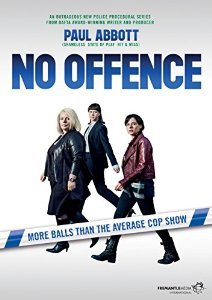 Balls - but not a man in sight.as D. I. Deering.
Balls - but not a man in sight.as D. I. Deering.
But every single person in it was excellent - Elaine Cassidy as the Polish speaking D. C. Kowalska - Alexandra Roach as the rather shy and prim D. S. Freers -
Oh, did I mention that this show has wonderful roles for women? (And, amazingly, the show has completed its whole run, and I haven't yet heard my partner say that it's good but 'makes men look bad,' as he did, on a regular basis, about Scott and Bailey. Perhaps we aren't seeing enough of each other.)
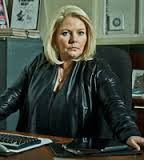 Joanna ScanlonThe Guardian called the programme 'a love letter to Manchester.' I don't know Manchester at all, and I'm not a bit in love with it, but I still thoroughly enjoyed No Offence. The script and all the acting was as good as it gets.
Joanna ScanlonThe Guardian called the programme 'a love letter to Manchester.' I don't know Manchester at all, and I'm not a bit in love with it, but I still thoroughly enjoyed No Offence. The script and all the acting was as good as it gets.
The penultimate episode disappointed me a little. It seemed that it was falling back on the good old detective novel ploy of making 'who-dunnit' the one character who - because of personality, lack of motive, means, opportunity, etc - absolutely could not have done it... And then by an unconvincing and unlikely twist, revealing that it was this character wot dun it after all.
My mother used to read a lot of detective novels, and I quickly found that - especially with the traditional, British 'country house' type - you could skim through the introductions of the characters at the start, decide which one could not possibly be the murderer, and then flip to the back to discover by what hokey-pokery the author had made it possible that they were.
Since this trickery was the whole point - not insight into human nature, or commentary on society - I couldn't be bothered wading through the rest of the set-dressing. The point of these novels, I gather, from friends who enjoy them, is solving the puzzle. Fair enough for those who like that sort of thing - they will be better judges of these books than me. I've never been a puzzle-solving, crosswords and sudoko sort of person.
I was put off detective novels for quite a while - until, much later, I discovered Minette Walters and Mo Hayder, whose novels are more 'why-dun-it' than 'who-dunnit.' With plenty of commentary and insight on both society and human nature, together with a gripping plot. The comment and insight is biased, of course, and not necessarily truthful or accurate - but arguing with the book's assumptions is part of the fun.
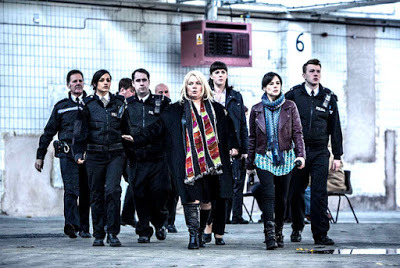 The No Offence cast
The No Offence cast
So when I thought No Offence was heading the way of the puzzle plot, it saddened me. All that characterisation, I thought, all that quality acting - just to lead up to 'Who'd-Have-Thought-It?' twist ending.
The penultimate episode also disappointed because it looked like D. I. Deering was going all soft and gooey, like any girlie.
But I watched the last epidode anyway, for completion's sake - and was glad I did. It took me by surprise, and made me sit up straight on the sofa. D. I. Deering hadn't gone soft after all. And things are left in a very promising place for the new series we're promised next year.
I'll say no more, because I don't want to spoil it for anyone who hasn't seen it yet. But honestly, it's very good.
 Balls - but not a man in sight.as D. I. Deering.
Balls - but not a man in sight.as D. I. Deering.But every single person in it was excellent - Elaine Cassidy as the Polish speaking D. C. Kowalska - Alexandra Roach as the rather shy and prim D. S. Freers -
Oh, did I mention that this show has wonderful roles for women? (And, amazingly, the show has completed its whole run, and I haven't yet heard my partner say that it's good but 'makes men look bad,' as he did, on a regular basis, about Scott and Bailey. Perhaps we aren't seeing enough of each other.)
 Joanna ScanlonThe Guardian called the programme 'a love letter to Manchester.' I don't know Manchester at all, and I'm not a bit in love with it, but I still thoroughly enjoyed No Offence. The script and all the acting was as good as it gets.
Joanna ScanlonThe Guardian called the programme 'a love letter to Manchester.' I don't know Manchester at all, and I'm not a bit in love with it, but I still thoroughly enjoyed No Offence. The script and all the acting was as good as it gets.The penultimate episode disappointed me a little. It seemed that it was falling back on the good old detective novel ploy of making 'who-dunnit' the one character who - because of personality, lack of motive, means, opportunity, etc - absolutely could not have done it... And then by an unconvincing and unlikely twist, revealing that it was this character wot dun it after all.
My mother used to read a lot of detective novels, and I quickly found that - especially with the traditional, British 'country house' type - you could skim through the introductions of the characters at the start, decide which one could not possibly be the murderer, and then flip to the back to discover by what hokey-pokery the author had made it possible that they were.
Since this trickery was the whole point - not insight into human nature, or commentary on society - I couldn't be bothered wading through the rest of the set-dressing. The point of these novels, I gather, from friends who enjoy them, is solving the puzzle. Fair enough for those who like that sort of thing - they will be better judges of these books than me. I've never been a puzzle-solving, crosswords and sudoko sort of person.
I was put off detective novels for quite a while - until, much later, I discovered Minette Walters and Mo Hayder, whose novels are more 'why-dun-it' than 'who-dunnit.' With plenty of commentary and insight on both society and human nature, together with a gripping plot. The comment and insight is biased, of course, and not necessarily truthful or accurate - but arguing with the book's assumptions is part of the fun.
 The No Offence cast
The No Offence castSo when I thought No Offence was heading the way of the puzzle plot, it saddened me. All that characterisation, I thought, all that quality acting - just to lead up to 'Who'd-Have-Thought-It?' twist ending.
The penultimate episode also disappointed because it looked like D. I. Deering was going all soft and gooey, like any girlie.
But I watched the last epidode anyway, for completion's sake - and was glad I did. It took me by surprise, and made me sit up straight on the sofa. D. I. Deering hadn't gone soft after all. And things are left in a very promising place for the new series we're promised next year.
I'll say no more, because I don't want to spoil it for anyone who hasn't seen it yet. But honestly, it's very good.
Published on July 03, 2015 16:00
June 26, 2015
More of the Pond in the Pot.
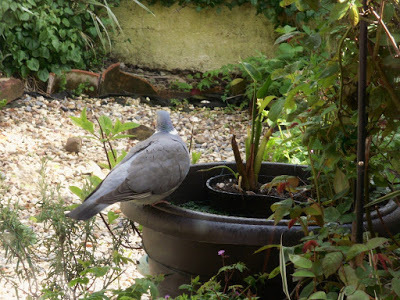
The pond in a pot's been in place for a month now. The plants seem settled and happy. It's certainly attracting more insects of all kinds - bees, hoverflies, lace-wings, bluebottles, and just unidentified wingy-things.
The cunning plot was that by attracting more insects, we would attract more birds. Well, we've had a few fleeting visits from great tits, blue tits, sparrows and starlings - but mostly it's been the wood pigeons. They caught on fast to the fact that we put out peanuts, and now they loiter with intent, on the fence and in the hedge.
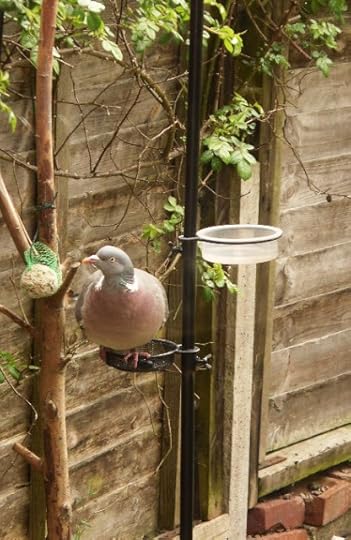
I thought they were interested in the pond, and so they are.
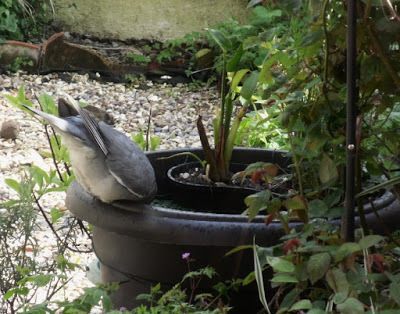
It's quite funny to see them sit on the edge of the pot and perform a stately bow, to get a drink.
But the water-lily.
I go out first thing every morning, to fish fallen leaves from the pond. (With the strong winds over recent weeks, I've been fishing out twigs and small branches, never mind leaves.)
I was thrilled, one morning, to see that the water-lily had sent up a bud, which was just under the surface. You can see it at the centre of the picture below.
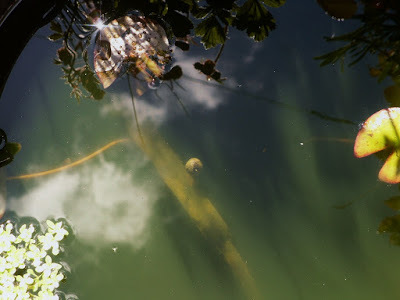
I hadn't expected it to bud so soon, or even this year. It seemed to have appeared quickly, but I thought I just hadn't noticed. In a week or so, I thought, it might open.
The next day, it was like this.
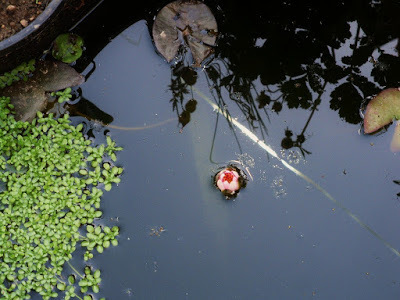
I could scarcely believe it. I was working in the garden that day. About twenty minutes later, I passed by the pond again -

Water-lilies - recommended for impatient people.
Published on June 26, 2015 16:00
June 19, 2015
Scrabbling for Posterity
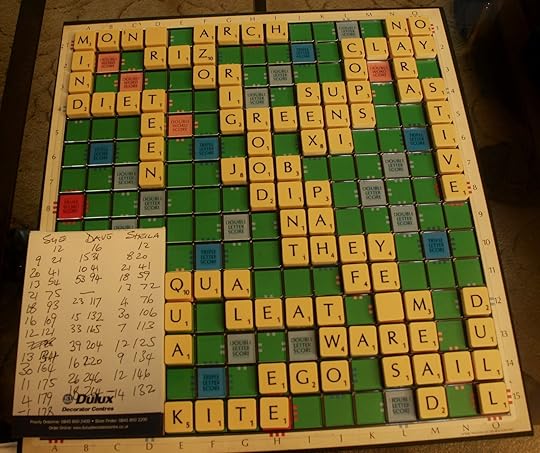
For months now, I've played Scrabble almost every Sunday afternoon.
I've always been fascinated by the patterns that spontaneously grow as you add word to word. I have a plan to make them into an installation, and sell it to Tate Modern for tens of thousands.
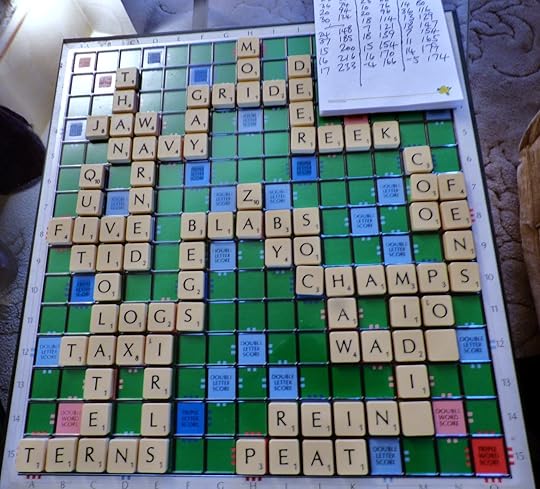
Or you could set it as a writing exercise - compose a short story or poem using all the words on this board...
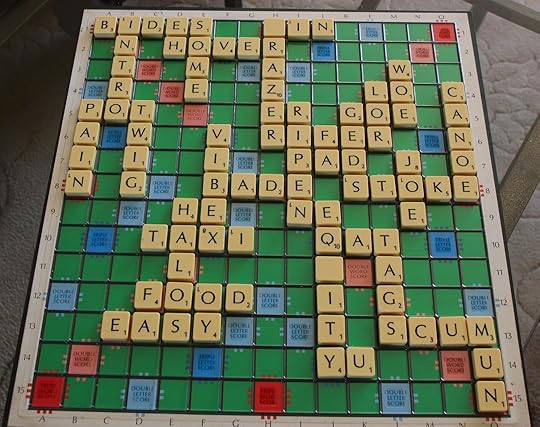
All the words seen here are genuine words, to be found in the Official Scrabble Dictionary - though there's many I haven't heard of. Tid? Riz? I'm always slowing down the game by demanding to know 'what that means.'
Davy is nearly always the winner, by hundreds of points, because he has a mathematical mind and doesn't care what the words mean, so long as they're allowed and score highly. (Though he is always grumbling that the strange words defined in the dictionary as 'Scots usage' are news to him. Words like 'ee' and 'em.' That's the whole word - em. I think it means 'uncle.')
After his first turn, Sheila and I usually offer to fetch our coats. With his first go this Sunday, he used up all his seven letters (thus earning a 50-point bonus) and got on a treble word square. He wondered aloud if the 50 points were trebled too - but Sheila declared that she didn't care what the rules were, if he tripled the 50 along with the rest of his score, she was chucking the board up the garden. So he only beat us by his usual 200 or so.
And then, in the second game, he used all seven letters in a turn three times. We fetched our coats.
Published on June 19, 2015 16:00
June 12, 2015
Why We Write...
Just posting a link this week - but it's a link to the Royal Literary Fund site, where you can find lots of podcasts and articles by the RLF's band of writers. Which they can call up with a whistle at any time. I said to one writer, at a Birmingham RLF meeting, that he'd travelled a long way to attend. He replied, "I'd crawl over broken glass for the RLF." The RLF tends to evoke a strong loyalty.
Anyroad up, shucks, here's the link.
Anyroad up, shucks, here's the link.
Published on June 12, 2015 16:00
June 5, 2015
Ninja Driving Update
At last, at last, at long "&*!+ last.
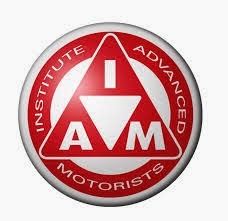
I have been given the go-ahead by my local IAM group to take the test. It's all in the works at the moment, but I will finally be taking the test and, if I pass it, I shall get what my mother always called a sticky-foot to prove it.
Things moved quickly once I was given a new Mentor, Mike. An interesting man, Mike. A retired company director, he designed and manufactured components for oil-rigs. He volunteers at his local hospital, has been a racing driver (as a hobby, I think), and has a pilot's license. At the moment, when not at the hospital or helping people like me, he's learning to drive a bus - 'I always wanted to drive a bus.'
My last mentor was a retired para-medic, whose tales of thrills and spills in an ambulance entertained me hugely. I'd recommend the IAM course to anyone, but I think especially to writers. You meet such great people, with stories to tell.
Mike is a terrific teacher too - he says he's spent his life managing people and trying to bring the best out of them. The practice has made him very good at it. My first drive with him was for assessment, and I was feeling a bit weary of the whole thing, since I didn't seem to be making any progress. At the end of the drive, Mike turned to me and said, "Well, that was wonderful! Much, much better than I'd been led to believe! If you took the test tomorrow, you'd pass it."
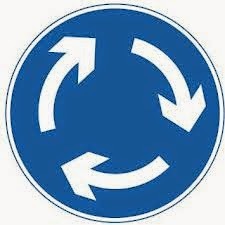 This was a surprise, and immensely cheering. We have, nevertheless, spent some weeks practicing: joining and leaving motorways, reversing round left-hand bends, approaching and navigating roundabouts, three-point turns, parallel parking and reversing into marked bays. This last one, I have to admit, I'm still not very good at. Mike admitted that neither was he. "It's much easier if there are cars for you to reverse between." It is.
This was a surprise, and immensely cheering. We have, nevertheless, spent some weeks practicing: joining and leaving motorways, reversing round left-hand bends, approaching and navigating roundabouts, three-point turns, parallel parking and reversing into marked bays. This last one, I have to admit, I'm still not very good at. Mike admitted that neither was he. "It's much easier if there are cars for you to reverse between." It is.
I practiced commentary, which I enjoy now. It sharpens observation. You just call out the hazards you spot as you drive along. This really means calling out every single thing you see, since every damn thing, except possibly the pigeons on the rooftops, is a hazard. Lights red in distance - car coming up behind, lane 2 - junction to left, car - parked car, brake lights - cyclist - dog-walker - car reversing, driveway... I called out all the road-signs too, to circumvent the nasty little habit examiners have of suddenly asking you what the last three road-signs were. If you've called them all out, you'll have a better chance of remembering them, and you've already proved that you've seen them - so there's little point in quizzing you on them.
Mike assured me that the actual examiner - a police driver - would not be nearly as demanding as the examiner I had to impress in order to be put through for the test. This always seems to be the case. It's harder, in my experience, to please an agent than a publisher. It's harder to please an audition panel than an audience. The real examiner would not be looking for by-the-book perfection, but only expecting me to show safer-driving, better car-control and observation than the average driver.
While we were driving, one day, a flash nit in a Porsche badly cut us up in his desperation to overtake despite the narrow road and on-coming traffic making this a very poor decision. He then had to crowd back in front of us because of oncoming traffic, braking hard to avoid running into the car in front. (He only had room to do this because of the safe gap I'd left between me and the car in front of me.)
Reader, I remained calm, merely commentating, as I slowed, that I was dropping back to let the big eejit have plenty of room.
From a safe following distance, we wryly observed the eejit's swerving and hard braking as he careered on, overtaking and cutting in, no doubt congratulating himself all the while on what a fine driver he was, and how he was showing up all us noddies crawling along at the speed limit.
Mike said, 'If this had been your test, I can guarantee that character would find the Police at his door by the end of the day.' Seeing my puzzlement, he added, 'Your examiner will be an acting Police Officer. He don't let that sort of thing pass.' So beware, flash eejits in Porsches. You never know when the little Micra you cut up is taking part in an Advanced Test, and the passenger is the Polis.
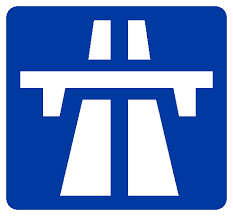
Came the day of the Pre-Test Run. This was my third. And, I passed it! Finally.
I knew exactly what speed I should be doing at any time, and kept to it. In the motorway section, I got up to 60 on the slip-road, and slotted smoothly into the traffic.
I kept up a commentary on the traffic in front and coming up behind, and remembered to say 'Lane One and Lane Two' instead of 'slow lane' and 'fast lane' (which is a no-no. There is no 'fast lane.' The speed limit is exactly the same in all motorway lanes.) There was no lane Three, since this was the M54, with its concrete slabs, like driving over corrugated iron.
I overtook a lorry, first checking traffic coming up behind me, and looking over my shoulder to make sure nothing was lurking in the blind spot. On passing the lorry, I used the off-side mirror to check that I could see the entire front of the lorry before moving back in front of it, without slowing down.
I signalled at the three hundred yard sign, waited until I was fully on the slip-road before cancelling the signal, and brought the speed down to the new limit. "That was lovely," the IAM examiner purred. Which was nice. And a change from his usual remarks.
I think there are only two - maybe three - 'Stop' signs in the whole of the West Midlands, and the IAM examiner makes sure that he takes you past one of them. Last time I failed to spot it, even when he guided me round in a circle for a second go. This time I spotted it from the top of a steep hill, and said (commentating):
 "Stop!" I came to a dead halt at that sign, put on the hand-brake, and counted, 'One elephant, two elephant, three elephant, four elephant," in my head before releasing the brake and going on. (When it was safe to do so, of course.)
"Stop!" I came to a dead halt at that sign, put on the hand-brake, and counted, 'One elephant, two elephant, three elephant, four elephant," in my head before releasing the brake and going on. (When it was safe to do so, of course.)
When we got back to Mike's, after I'd been given the go-ahead for the real test, he said, "Gimme a hug! Lovely! That Stop sign was lovely! By the book - you did it by the book. Handbrake - four seconds!"
So, there we go. Next, I hope I'll be able to report that I'm a bona fide Advanced Driver.
Late breaking news. I've just been given a date for my test - the real one. It's a week today, on the 13th.

I have been given the go-ahead by my local IAM group to take the test. It's all in the works at the moment, but I will finally be taking the test and, if I pass it, I shall get what my mother always called a sticky-foot to prove it.
Things moved quickly once I was given a new Mentor, Mike. An interesting man, Mike. A retired company director, he designed and manufactured components for oil-rigs. He volunteers at his local hospital, has been a racing driver (as a hobby, I think), and has a pilot's license. At the moment, when not at the hospital or helping people like me, he's learning to drive a bus - 'I always wanted to drive a bus.'
My last mentor was a retired para-medic, whose tales of thrills and spills in an ambulance entertained me hugely. I'd recommend the IAM course to anyone, but I think especially to writers. You meet such great people, with stories to tell.
Mike is a terrific teacher too - he says he's spent his life managing people and trying to bring the best out of them. The practice has made him very good at it. My first drive with him was for assessment, and I was feeling a bit weary of the whole thing, since I didn't seem to be making any progress. At the end of the drive, Mike turned to me and said, "Well, that was wonderful! Much, much better than I'd been led to believe! If you took the test tomorrow, you'd pass it."
 This was a surprise, and immensely cheering. We have, nevertheless, spent some weeks practicing: joining and leaving motorways, reversing round left-hand bends, approaching and navigating roundabouts, three-point turns, parallel parking and reversing into marked bays. This last one, I have to admit, I'm still not very good at. Mike admitted that neither was he. "It's much easier if there are cars for you to reverse between." It is.
This was a surprise, and immensely cheering. We have, nevertheless, spent some weeks practicing: joining and leaving motorways, reversing round left-hand bends, approaching and navigating roundabouts, three-point turns, parallel parking and reversing into marked bays. This last one, I have to admit, I'm still not very good at. Mike admitted that neither was he. "It's much easier if there are cars for you to reverse between." It is.I practiced commentary, which I enjoy now. It sharpens observation. You just call out the hazards you spot as you drive along. This really means calling out every single thing you see, since every damn thing, except possibly the pigeons on the rooftops, is a hazard. Lights red in distance - car coming up behind, lane 2 - junction to left, car - parked car, brake lights - cyclist - dog-walker - car reversing, driveway... I called out all the road-signs too, to circumvent the nasty little habit examiners have of suddenly asking you what the last three road-signs were. If you've called them all out, you'll have a better chance of remembering them, and you've already proved that you've seen them - so there's little point in quizzing you on them.
Mike assured me that the actual examiner - a police driver - would not be nearly as demanding as the examiner I had to impress in order to be put through for the test. This always seems to be the case. It's harder, in my experience, to please an agent than a publisher. It's harder to please an audition panel than an audience. The real examiner would not be looking for by-the-book perfection, but only expecting me to show safer-driving, better car-control and observation than the average driver.
While we were driving, one day, a flash nit in a Porsche badly cut us up in his desperation to overtake despite the narrow road and on-coming traffic making this a very poor decision. He then had to crowd back in front of us because of oncoming traffic, braking hard to avoid running into the car in front. (He only had room to do this because of the safe gap I'd left between me and the car in front of me.)
Reader, I remained calm, merely commentating, as I slowed, that I was dropping back to let the big eejit have plenty of room.
From a safe following distance, we wryly observed the eejit's swerving and hard braking as he careered on, overtaking and cutting in, no doubt congratulating himself all the while on what a fine driver he was, and how he was showing up all us noddies crawling along at the speed limit.
Mike said, 'If this had been your test, I can guarantee that character would find the Police at his door by the end of the day.' Seeing my puzzlement, he added, 'Your examiner will be an acting Police Officer. He don't let that sort of thing pass.' So beware, flash eejits in Porsches. You never know when the little Micra you cut up is taking part in an Advanced Test, and the passenger is the Polis.

Came the day of the Pre-Test Run. This was my third. And, I passed it! Finally.
I knew exactly what speed I should be doing at any time, and kept to it. In the motorway section, I got up to 60 on the slip-road, and slotted smoothly into the traffic.
I kept up a commentary on the traffic in front and coming up behind, and remembered to say 'Lane One and Lane Two' instead of 'slow lane' and 'fast lane' (which is a no-no. There is no 'fast lane.' The speed limit is exactly the same in all motorway lanes.) There was no lane Three, since this was the M54, with its concrete slabs, like driving over corrugated iron.
I overtook a lorry, first checking traffic coming up behind me, and looking over my shoulder to make sure nothing was lurking in the blind spot. On passing the lorry, I used the off-side mirror to check that I could see the entire front of the lorry before moving back in front of it, without slowing down.
I signalled at the three hundred yard sign, waited until I was fully on the slip-road before cancelling the signal, and brought the speed down to the new limit. "That was lovely," the IAM examiner purred. Which was nice. And a change from his usual remarks.
I think there are only two - maybe three - 'Stop' signs in the whole of the West Midlands, and the IAM examiner makes sure that he takes you past one of them. Last time I failed to spot it, even when he guided me round in a circle for a second go. This time I spotted it from the top of a steep hill, and said (commentating):
 "Stop!" I came to a dead halt at that sign, put on the hand-brake, and counted, 'One elephant, two elephant, three elephant, four elephant," in my head before releasing the brake and going on. (When it was safe to do so, of course.)
"Stop!" I came to a dead halt at that sign, put on the hand-brake, and counted, 'One elephant, two elephant, three elephant, four elephant," in my head before releasing the brake and going on. (When it was safe to do so, of course.)When we got back to Mike's, after I'd been given the go-ahead for the real test, he said, "Gimme a hug! Lovely! That Stop sign was lovely! By the book - you did it by the book. Handbrake - four seconds!"
So, there we go. Next, I hope I'll be able to report that I'm a bona fide Advanced Driver.
Late breaking news. I've just been given a date for my test - the real one. It's a week today, on the 13th.
Published on June 05, 2015 16:00
May 29, 2015
A Pond In A Pot.
'What are you up to now, Suzzie?' Davy asked me, suspiciously, the other day.
Not what I'm doing, note, but what 'I'm up to.'
I'm reminded of the old joke where the mother says, 'Go and find out what your brother's doing and tell him to stop at once.'
This (below) is what I'm up to.
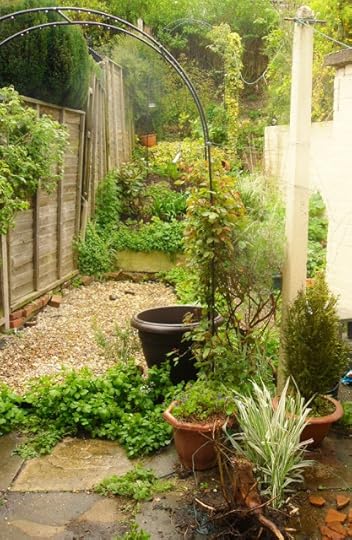 Pond in a pot See that big black pot at the edge of the gravel? That's my garden pond, viewed from my kitchen door. I don't often watch gardening programmes, but when I do, I quite often get up to something as a result. It's probably just as well I don't watch them very often. I caught Diarmuid Gavin telling the nation that the single most effective thing you can do, to increase wildlife in your garden, is make a pond. You don't even have to dig a hole. You can put the pond in a pot.
Pond in a pot See that big black pot at the edge of the gravel? That's my garden pond, viewed from my kitchen door. I don't often watch gardening programmes, but when I do, I quite often get up to something as a result. It's probably just as well I don't watch them very often. I caught Diarmuid Gavin telling the nation that the single most effective thing you can do, to increase wildlife in your garden, is make a pond. You don't even have to dig a hole. You can put the pond in a pot.
Something about having a pond in a pot appealed to me (not least, the bit about not digging a hole.) I started reading up on garden ponds, about how they increase the eco-variety in your garden. They increase the number of insects and the habitat for insects - and so attract more of the birds and animals who eat those insects. I went out and acquired a large pot. I found one on sale.It's not pretty, but it was big and inexpensive.
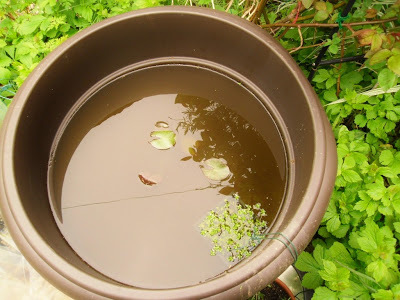
For days, I moved the pot about, trying to decide where to place it. For weeks, I set out buckets to catch rainwater to fill it. And then - oh, the thrill - I was able to add a water-lily - a miniature red one - and an oxengenating plant.
A pond also needs margin plants, to shelter and attract insects, and a bank for birds to land - and also to provide a way out for creatures that fall in. It's hard to provide that in a deep pot, so I slung a basket of marginal plants from the side.
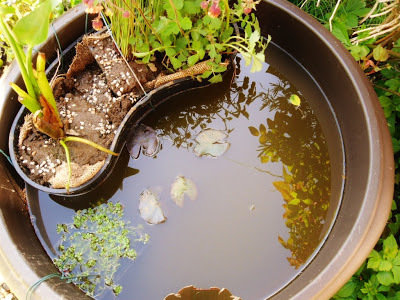
There's a reed, and a couple of flowering plants, all native to Britain. It looks a bit bare at the moment, but I'm hoping other plants will come in and root on the 'bank.'
I've arranged other potted plants around it, both to soften the big black pot, and also to give animals a leg up and a leg down. I may grow a 'tier' of herbs along side it, to make them a step-ladder.
Already, I've seen more insects and birds taking an interest, and it's only been full and planted up for a day (as I write.) Only this morning there was a big wood-pigeon hopping about from line-post, to rose-arch, to fence and back again. He seemed to be trying to find a way down to the pool pot. So I'm thinking about adding some lower perches nearer to it. Not that I much want to attract thumping big wood pigeons. We have no shortage of them. But it's a start!

Not what I'm doing, note, but what 'I'm up to.'
I'm reminded of the old joke where the mother says, 'Go and find out what your brother's doing and tell him to stop at once.'
This (below) is what I'm up to.
 Pond in a pot See that big black pot at the edge of the gravel? That's my garden pond, viewed from my kitchen door. I don't often watch gardening programmes, but when I do, I quite often get up to something as a result. It's probably just as well I don't watch them very often. I caught Diarmuid Gavin telling the nation that the single most effective thing you can do, to increase wildlife in your garden, is make a pond. You don't even have to dig a hole. You can put the pond in a pot.
Pond in a pot See that big black pot at the edge of the gravel? That's my garden pond, viewed from my kitchen door. I don't often watch gardening programmes, but when I do, I quite often get up to something as a result. It's probably just as well I don't watch them very often. I caught Diarmuid Gavin telling the nation that the single most effective thing you can do, to increase wildlife in your garden, is make a pond. You don't even have to dig a hole. You can put the pond in a pot.Something about having a pond in a pot appealed to me (not least, the bit about not digging a hole.) I started reading up on garden ponds, about how they increase the eco-variety in your garden. They increase the number of insects and the habitat for insects - and so attract more of the birds and animals who eat those insects. I went out and acquired a large pot. I found one on sale.It's not pretty, but it was big and inexpensive.

For days, I moved the pot about, trying to decide where to place it. For weeks, I set out buckets to catch rainwater to fill it. And then - oh, the thrill - I was able to add a water-lily - a miniature red one - and an oxengenating plant.
A pond also needs margin plants, to shelter and attract insects, and a bank for birds to land - and also to provide a way out for creatures that fall in. It's hard to provide that in a deep pot, so I slung a basket of marginal plants from the side.

There's a reed, and a couple of flowering plants, all native to Britain. It looks a bit bare at the moment, but I'm hoping other plants will come in and root on the 'bank.'
I've arranged other potted plants around it, both to soften the big black pot, and also to give animals a leg up and a leg down. I may grow a 'tier' of herbs along side it, to make them a step-ladder.
Already, I've seen more insects and birds taking an interest, and it's only been full and planted up for a day (as I write.) Only this morning there was a big wood-pigeon hopping about from line-post, to rose-arch, to fence and back again. He seemed to be trying to find a way down to the pool pot. So I'm thinking about adding some lower perches nearer to it. Not that I much want to attract thumping big wood pigeons. We have no shortage of them. But it's a start!

Published on May 29, 2015 16:00
May 22, 2015
A Walk On Walton Hill...
Join me in a walk over Walton Hill...It's a steep hill...
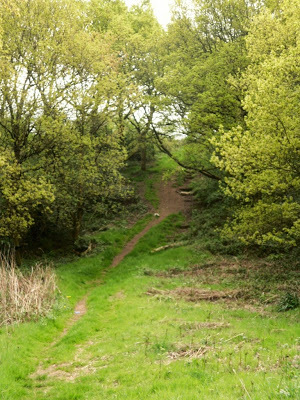
But we're here to see the bluebells. We come every year to see the bluebells.
There are two hills on the National Trust property at Clent - Walton Hill and Clent Hill.

Both are pooled and deep in bluebells at this time of year.
There was a bank whereon the bells spangled blue and white.


We walked to the gate at the end of the path.

Gusts of hyacinth scent blew to us on the breeze.
At the gate we turned left and climbed uphill.

'Massed bluebells indicate undisturbed ancient woodland.'

You could see the leaves turning from their true colour of red to green, as they start to produce cholorphyll.
 The birds were yelling their heads off again. The great tits were swinging incessantly on that creaky gate of theirs.
The birds were yelling their heads off again. The great tits were swinging incessantly on that creaky gate of theirs.


And then we went to the pub. You can only take so much overwhelming natural beauty.

But we're here to see the bluebells. We come every year to see the bluebells.
There are two hills on the National Trust property at Clent - Walton Hill and Clent Hill.

Both are pooled and deep in bluebells at this time of year.
There was a bank whereon the bells spangled blue and white.


We walked to the gate at the end of the path.

Gusts of hyacinth scent blew to us on the breeze.
At the gate we turned left and climbed uphill.

'Massed bluebells indicate undisturbed ancient woodland.'

You could see the leaves turning from their true colour of red to green, as they start to produce cholorphyll.
 The birds were yelling their heads off again. The great tits were swinging incessantly on that creaky gate of theirs.
The birds were yelling their heads off again. The great tits were swinging incessantly on that creaky gate of theirs.

And then we went to the pub. You can only take so much overwhelming natural beauty.
Published on May 22, 2015 16:00
May 15, 2015
National Young Writers' Awards
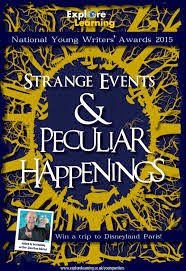
I picked up this leaflet at Sainsbury's checkout the other day.
The closing date for entry to the competition is Friday June 5th June, 2015, so there isn't long left to enter - but you can upload your story on-line, which might save a bit of time. It's open to any child under the age of 14, resident in the UK. The task is to write a story of up to 500 words on the theme, 'Strange Events and Peculiar Happenings.'
A school can also enter.
This is the competition that gave me my start as a writer, though it's wearing a slight disguise. When I entered, over five decades ago, it was sponsored by The Daily Mirror (before that newspaper was bought by Cap'n Bob and became just another trashy mag.)
Now the competition's sponsored by some outfit called Explore Learning - and the first prize they're offering is a trip to Disneyland, plus £500 worth of books for your school.
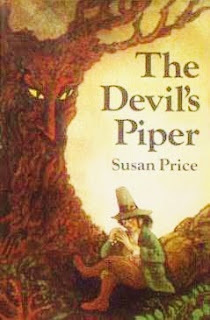 My first book, cover by Errol Le CainI won the competition two years running, at 15 and 16 - and then went on to win a contract with Faber at 16. For the competition, I won a cash prize of £50, which seemed a vast sum to me. (It wasn't, even then.)
My first book, cover by Errol Le CainI won the competition two years running, at 15 and 16 - and then went on to win a contract with Faber at 16. For the competition, I won a cash prize of £50, which seemed a vast sum to me. (It wasn't, even then.)Personally, I wouldn't have wanted anything like a trip to Disneyland or anywhere else, then or now. Give me the cash! - and I'll decide how and when I want to spend it. Quite probably in the Shetlands or Outer Hebrides. Then and now.
But to each their own.
I post about the competition here, in case there are any young writers reading this - or any parents, aunties, uncles or grandparents of young writers who might want to pass on the entry form.
Health Warning: Winning this competition could result in a life as a professional writer. You may want to go and do something healthier and better paid instead.My Amazon Page My website
Published on May 15, 2015 16:00
May 8, 2015
Why Were The Polls So Wrong...?
So, once again, the polls got it wrong. They said that Labour and
 Tories were neck and neck, and there would be a hung Parliament, with bargaining and horse-deals between parties to get acts passed - and perhaps another election in a few months time.
Tories were neck and neck, and there would be a hung Parliament, with bargaining and horse-deals between parties to get acts passed - and perhaps another election in a few months time.
And what did we wake up to on Friday morning? - A Tory majority.
As my friends in Scotland say, 'Whatever you vote, you get Tory.'
The Guardian site has an article asking, What went wrong with the polls?
I can tell you. Here it is. Brace yourselves. This may come as a shock. The reason the polls were wrong is: Tories lie.
You never suspected that, did you?
As it happened, on election day, I was reading a book on Maths. I know this is hard to believe, but it is true. The book is: Why Do Buses Come In Threes? By coincidence I was reading the pages where it explains why sampling is often skewed.
To find out, for instance, which is the nation's favourite biscuit, you don't knock on every door in the land and ask. You ask a small but representative sample of the nation's population, and use that figure as a basis, making sure to include people from every age and income-group, from every ethnic and religious group, from every corner of the UK.
 Wikimedia: Dezidor It would be impossible, realistically, to ask even 1% of UK's population this question - 1% would be six hundred and forty thousand people. But if your sample is representative enough, the result will be reasonably accurate, even if you ask only a much smaller number. (My money is on the milk chocolate digestive, with shortbread a close second.)
Wikimedia: Dezidor It would be impossible, realistically, to ask even 1% of UK's population this question - 1% would be six hundred and forty thousand people. But if your sample is representative enough, the result will be reasonably accurate, even if you ask only a much smaller number. (My money is on the milk chocolate digestive, with shortbread a close second.)
Polls become less accurate as the sample group becomes smaller and/or less representive. How representative a sample is counts for a great deal. You could ask a million football fans which sport is the most popular, and be fairly certain that you'll get the answer: football. The sample group was large, but it was unrepresentative. But you might get a similarly biased answer by putting the question only to the eleven members of your local football team. The sample was small but, again, unrepresentative. Football probably is, at present, the most popular UK sport - but these samples would tell you nothing about, for instance, the rising popularity of cycling.
This is how advertisers get away with claiming that '8 out of 10' people fetishise their product, or that their 'scientific test' proves that their vitamin supplement increases intelligence. They're very careful who they ask, and who they test. But hey - they did a test! They conducted a poll! Proves it. Stands to sense.
But even if a poll is conducted absolutely honestly,
on a large scale and over a widely representative sample,
there's something else that can completely screw it up. That is, humanity's lamentable tendency to lie.
This is why social scientists, who have to conduct research by A sneaky pollster (Public Domain.)asking people things, have a rotten life. Other scientists can just force rats to run round mazes or learn tricks for food. Rats, despite their reputation for sneakiness, can't agree to be interviewed and then not turn up, thus ruining a study that took months to design and prepare (with great care taken to make the sample representative.) They can't take part in an interview and then change their minds and refuse to allow their answers to be used. These things happened to more than one social science student I met when I was an RLF Fellow.
A sneaky pollster (Public Domain.)asking people things, have a rotten life. Other scientists can just force rats to run round mazes or learn tricks for food. Rats, despite their reputation for sneakiness, can't agree to be interviewed and then not turn up, thus ruining a study that took months to design and prepare (with great care taken to make the sample representative.) They can't take part in an interview and then change their minds and refuse to allow their answers to be used. These things happened to more than one social science student I met when I was an RLF Fellow.
Most of all, the rats can't lie, thus making the study's results inaccurate.
Statisticians have been aware for a long time that there are some subjects on which it's almost impossible to get an honest answer. Do you take part in illegal activity, such as drug-taking? How much do you earn? How much do you drink? How many sexual partners have you had? - On any subject where people feel they may be judged unkindly, or come in second or third best to Public Domain: Vicolsomeone else, you can confidently expect people to lie. If you're trying to get an acceptably accurate answer to, how many times a week the average Briton has sex, or takes cocaine, you're stuffed before you start. Some people will exaggerate, some will depreciate, depending on the image they wish to present. A few will answer honestly, but even so, your results will be wildly inaccurate.
Public Domain: Vicolsomeone else, you can confidently expect people to lie. If you're trying to get an acceptably accurate answer to, how many times a week the average Briton has sex, or takes cocaine, you're stuffed before you start. Some people will exaggerate, some will depreciate, depending on the image they wish to present. A few will answer honestly, but even so, your results will be wildly inaccurate.
So how does this relate to the election? Well, for the results to be so inaccurate, the most likely explanation is that people lied. The Guardian article (link above) is diplomatic and talks about the need 'to do polls better.' But the polls had a large sample, and they represented everyone who could vote. They should have been much more accurate than they were. The simplest explanation is: someone was lying. Who could it be?
Well, the Tory majority was unexpected. It wasn't there in the figures used for the calculations. Which strongly suggests that, of those who were asked their voting intentions, it was overwhelmingly Tories who lied.
The same thing happened, according to 'Why Do Buses Come In Threes?' in the 1992 election, where the result was very different to that predicted by the polls.
The explanation is the same for both elections. Those intending to vote Tory lied.
Those intending to vote for other parties largely told the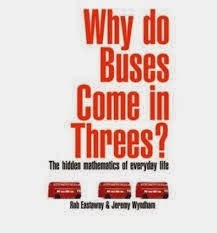 Why Do Buses Come In Threes?truth. But Tories said they hadn't decided, or that they were going to vote for some other party, or said their principles forbade them to answer.
Why Do Buses Come In Threes?truth. But Tories said they hadn't decided, or that they were going to vote for some other party, or said their principles forbade them to answer.
Of course, you might prefer the idea that enough people to give Cameron a majority really didn't make up their mind until - ooh - half an hour before. They took the trouble to make time in their day to go and vote, but they still didn't know, as they walked through the polling station door, how they were going to vote... Yeah, right. Or maybe they closed their eyes, jabbed the pencil at the ballot paper, and then voted Tory just because that's where the pencil landed.
Either way, it doesn't say a lot for the Tory electorate, does it?
Come on. The Tory voters lied.
But why would they? People of my acquaintance who voted SNP weren't shy about letting anyone know their intention. I was undecided myself, for a while, between Labour and Green. I can no longer rely on Labour to be socialist - they often seem like the Tory Party in sheep's clothing. Whereas the Green party seemed to offer a manifesto that was exactly what I want from the Labour Party. With a few days to go - not, note, while I was standing in the polling-booth with the pencil in my hand - I decided to vote Labour for two reasons.
One, I live in a Labour safe-seat. Voting Green wouldn't benefit the Greens - it would only diminish Labour and give a boost to the Tories, or even worse.
Also, the Greens, along with the good stuff, support a policy of theft - they want to give my copyrights on my intellectual property away for free. Socialism, I agree with. Theft, no.
We need, we badly need, a fairer, more representative voting system than this first-past the post malarkey. Are we going to get it, now the Tories have a majority? Are we cocoa. Nor would we have done if Labour had won a majority. But a hung parliament now...
The point is, I'm happy to tell anyone who I'm voting for, and why.
Many Tories, evidently, are strangely shy about it. How so?
Because they're ashamed to admit they're Tories. The Labour Party's values - not New Labour or Tory Lite - but the original and best Labour Party, stood for Solidarity - that is, standing by others and supporting them, defending their right to a good life as well as your own.
It stood for Sharing - not paying others less than their labour is worth to you, and then taking the wealth that you couldn't have created without them, and keeping it within the walls of your family and class, while blaming those poorer than you for being poor. (Even though you benefited from their labour far more than they did.)

The Labour Party's values are Kindness, Concern and Care for others - which is why it established the National Health Service (against Tory opposition), and tried hard to introduce (against Tory obstruction) an education system which is fair for all. Both of which the Tories and Tories-Lite have been dismantling for profit over decades now.
Those Tories who lied to the polls know all this fine well. And they know that what they planned to vote for is, frankly, nasty.
The Tories have taught all the newspapers they own - which is most of them - to squeal in chorus, 'The Politics of Envy,' whenever Labour is mentioned. But they mistake a sense of Justice and Fairness for envy - or perhaps they never knew how to tell the difference.
It's the Tories who resent and envy the tiny amounts spent on welfare benefits while managing to ignore the huge amounts being grabbed by tax evaders, the huge amounts grabbed by financiers. (Do you think Cameron will still close the Mayfair Loophole now that's he's got a majority? Don't hold your breath.)
Those Tories who lied about their voting intentions know full well that their Party represents Greed, and Greedy Bankers, and exploitation, and exploitative Big Business, and Privilege.
They know that Tax-Dodging is okay by Tories, so long as it's tax-dodging by the privileged, and Scrounging is okay, so long as the scroungers have crowns on their heads. It represents Division, not Sharing. The Tories are The Nasty Party, and they know it.
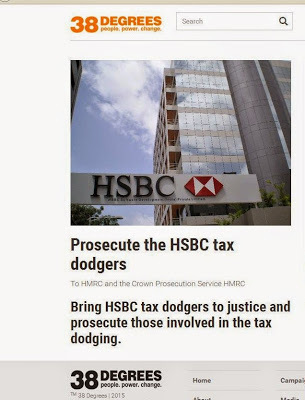
When those nice poll people asked, 'Who do you intend to vote for?' a lot of Tories were just too ashamed to tell the truth. Not too ashamed to vote for the nasty policies of the Nasty Party, but too ashamed to admit it.
So we go into another term of 'austerity,' but only for the defenceless. The Nasty Party will continue to target the poor and the sick, to order the disabled to pick up their beds and walk to work - and then they'll go to Church and pray to gentle Jesus while not listening to anything he said.
Education and Health will be handed over to Business - after all, what a success privitisation has made of the railways, eh? Just wait you until they get hospitals and schools fully into their claws. It'll be back to the values that made Britain great!
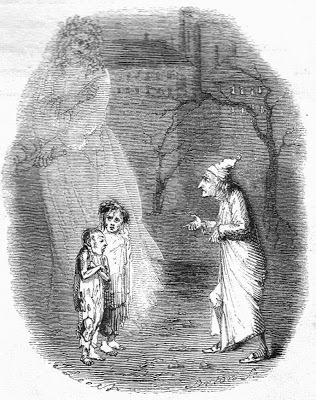 'Fear this girl, Want, but shun this boy, Ignorance.
'Fear this girl, Want, but shun this boy, Ignorance.
Now that the Tories have a majority, are you looking forward to them passing the TTIP bill, which will allow their pals in Big Business to sue any UK government which passes a law they don't agree with? Such as that pesky law to protect children from addiction by making all cigarette packages plain?
Who would want to admit that, while shrilly squealing about the EU 'governing' Britain, they willingly voted for a party planning to let Big Business make Britain's laws?
The Tories who were ashamed to admit how they were going to vote should be ashamed. I wish I could promise them that they will experience, in the fullest of full measure, exactly what they've voted for - but I suspect that one of the reasons for their shame is that they know fine well they won't.
 Tories were neck and neck, and there would be a hung Parliament, with bargaining and horse-deals between parties to get acts passed - and perhaps another election in a few months time.
Tories were neck and neck, and there would be a hung Parliament, with bargaining and horse-deals between parties to get acts passed - and perhaps another election in a few months time.And what did we wake up to on Friday morning? - A Tory majority.
As my friends in Scotland say, 'Whatever you vote, you get Tory.'
The Guardian site has an article asking, What went wrong with the polls?
I can tell you. Here it is. Brace yourselves. This may come as a shock. The reason the polls were wrong is: Tories lie.
You never suspected that, did you?
As it happened, on election day, I was reading a book on Maths. I know this is hard to believe, but it is true. The book is: Why Do Buses Come In Threes? By coincidence I was reading the pages where it explains why sampling is often skewed.
To find out, for instance, which is the nation's favourite biscuit, you don't knock on every door in the land and ask. You ask a small but representative sample of the nation's population, and use that figure as a basis, making sure to include people from every age and income-group, from every ethnic and religious group, from every corner of the UK.
 Wikimedia: Dezidor It would be impossible, realistically, to ask even 1% of UK's population this question - 1% would be six hundred and forty thousand people. But if your sample is representative enough, the result will be reasonably accurate, even if you ask only a much smaller number. (My money is on the milk chocolate digestive, with shortbread a close second.)
Wikimedia: Dezidor It would be impossible, realistically, to ask even 1% of UK's population this question - 1% would be six hundred and forty thousand people. But if your sample is representative enough, the result will be reasonably accurate, even if you ask only a much smaller number. (My money is on the milk chocolate digestive, with shortbread a close second.)Polls become less accurate as the sample group becomes smaller and/or less representive. How representative a sample is counts for a great deal. You could ask a million football fans which sport is the most popular, and be fairly certain that you'll get the answer: football. The sample group was large, but it was unrepresentative. But you might get a similarly biased answer by putting the question only to the eleven members of your local football team. The sample was small but, again, unrepresentative. Football probably is, at present, the most popular UK sport - but these samples would tell you nothing about, for instance, the rising popularity of cycling.
This is how advertisers get away with claiming that '8 out of 10' people fetishise their product, or that their 'scientific test' proves that their vitamin supplement increases intelligence. They're very careful who they ask, and who they test. But hey - they did a test! They conducted a poll! Proves it. Stands to sense.
But even if a poll is conducted absolutely honestly,
on a large scale and over a widely representative sample,
there's something else that can completely screw it up. That is, humanity's lamentable tendency to lie.
This is why social scientists, who have to conduct research by
 A sneaky pollster (Public Domain.)asking people things, have a rotten life. Other scientists can just force rats to run round mazes or learn tricks for food. Rats, despite their reputation for sneakiness, can't agree to be interviewed and then not turn up, thus ruining a study that took months to design and prepare (with great care taken to make the sample representative.) They can't take part in an interview and then change their minds and refuse to allow their answers to be used. These things happened to more than one social science student I met when I was an RLF Fellow.
A sneaky pollster (Public Domain.)asking people things, have a rotten life. Other scientists can just force rats to run round mazes or learn tricks for food. Rats, despite their reputation for sneakiness, can't agree to be interviewed and then not turn up, thus ruining a study that took months to design and prepare (with great care taken to make the sample representative.) They can't take part in an interview and then change their minds and refuse to allow their answers to be used. These things happened to more than one social science student I met when I was an RLF Fellow.Most of all, the rats can't lie, thus making the study's results inaccurate.
Statisticians have been aware for a long time that there are some subjects on which it's almost impossible to get an honest answer. Do you take part in illegal activity, such as drug-taking? How much do you earn? How much do you drink? How many sexual partners have you had? - On any subject where people feel they may be judged unkindly, or come in second or third best to
 Public Domain: Vicolsomeone else, you can confidently expect people to lie. If you're trying to get an acceptably accurate answer to, how many times a week the average Briton has sex, or takes cocaine, you're stuffed before you start. Some people will exaggerate, some will depreciate, depending on the image they wish to present. A few will answer honestly, but even so, your results will be wildly inaccurate.
Public Domain: Vicolsomeone else, you can confidently expect people to lie. If you're trying to get an acceptably accurate answer to, how many times a week the average Briton has sex, or takes cocaine, you're stuffed before you start. Some people will exaggerate, some will depreciate, depending on the image they wish to present. A few will answer honestly, but even so, your results will be wildly inaccurate.So how does this relate to the election? Well, for the results to be so inaccurate, the most likely explanation is that people lied. The Guardian article (link above) is diplomatic and talks about the need 'to do polls better.' But the polls had a large sample, and they represented everyone who could vote. They should have been much more accurate than they were. The simplest explanation is: someone was lying. Who could it be?
Well, the Tory majority was unexpected. It wasn't there in the figures used for the calculations. Which strongly suggests that, of those who were asked their voting intentions, it was overwhelmingly Tories who lied.
The same thing happened, according to 'Why Do Buses Come In Threes?' in the 1992 election, where the result was very different to that predicted by the polls.
The explanation is the same for both elections. Those intending to vote Tory lied.
Those intending to vote for other parties largely told the
 Why Do Buses Come In Threes?truth. But Tories said they hadn't decided, or that they were going to vote for some other party, or said their principles forbade them to answer.
Why Do Buses Come In Threes?truth. But Tories said they hadn't decided, or that they were going to vote for some other party, or said their principles forbade them to answer.Of course, you might prefer the idea that enough people to give Cameron a majority really didn't make up their mind until - ooh - half an hour before. They took the trouble to make time in their day to go and vote, but they still didn't know, as they walked through the polling station door, how they were going to vote... Yeah, right. Or maybe they closed their eyes, jabbed the pencil at the ballot paper, and then voted Tory just because that's where the pencil landed.
Either way, it doesn't say a lot for the Tory electorate, does it?
Come on. The Tory voters lied.
But why would they? People of my acquaintance who voted SNP weren't shy about letting anyone know their intention. I was undecided myself, for a while, between Labour and Green. I can no longer rely on Labour to be socialist - they often seem like the Tory Party in sheep's clothing. Whereas the Green party seemed to offer a manifesto that was exactly what I want from the Labour Party. With a few days to go - not, note, while I was standing in the polling-booth with the pencil in my hand - I decided to vote Labour for two reasons.
One, I live in a Labour safe-seat. Voting Green wouldn't benefit the Greens - it would only diminish Labour and give a boost to the Tories, or even worse.
Also, the Greens, along with the good stuff, support a policy of theft - they want to give my copyrights on my intellectual property away for free. Socialism, I agree with. Theft, no.
We need, we badly need, a fairer, more representative voting system than this first-past the post malarkey. Are we going to get it, now the Tories have a majority? Are we cocoa. Nor would we have done if Labour had won a majority. But a hung parliament now...
The point is, I'm happy to tell anyone who I'm voting for, and why.
Many Tories, evidently, are strangely shy about it. How so?
Because they're ashamed to admit they're Tories. The Labour Party's values - not New Labour or Tory Lite - but the original and best Labour Party, stood for Solidarity - that is, standing by others and supporting them, defending their right to a good life as well as your own.
It stood for Sharing - not paying others less than their labour is worth to you, and then taking the wealth that you couldn't have created without them, and keeping it within the walls of your family and class, while blaming those poorer than you for being poor. (Even though you benefited from their labour far more than they did.)

The Labour Party's values are Kindness, Concern and Care for others - which is why it established the National Health Service (against Tory opposition), and tried hard to introduce (against Tory obstruction) an education system which is fair for all. Both of which the Tories and Tories-Lite have been dismantling for profit over decades now.
Those Tories who lied to the polls know all this fine well. And they know that what they planned to vote for is, frankly, nasty.
The Tories have taught all the newspapers they own - which is most of them - to squeal in chorus, 'The Politics of Envy,' whenever Labour is mentioned. But they mistake a sense of Justice and Fairness for envy - or perhaps they never knew how to tell the difference.
It's the Tories who resent and envy the tiny amounts spent on welfare benefits while managing to ignore the huge amounts being grabbed by tax evaders, the huge amounts grabbed by financiers. (Do you think Cameron will still close the Mayfair Loophole now that's he's got a majority? Don't hold your breath.)
Those Tories who lied about their voting intentions know full well that their Party represents Greed, and Greedy Bankers, and exploitation, and exploitative Big Business, and Privilege.
They know that Tax-Dodging is okay by Tories, so long as it's tax-dodging by the privileged, and Scrounging is okay, so long as the scroungers have crowns on their heads. It represents Division, not Sharing. The Tories are The Nasty Party, and they know it.

When those nice poll people asked, 'Who do you intend to vote for?' a lot of Tories were just too ashamed to tell the truth. Not too ashamed to vote for the nasty policies of the Nasty Party, but too ashamed to admit it.
So we go into another term of 'austerity,' but only for the defenceless. The Nasty Party will continue to target the poor and the sick, to order the disabled to pick up their beds and walk to work - and then they'll go to Church and pray to gentle Jesus while not listening to anything he said.
Education and Health will be handed over to Business - after all, what a success privitisation has made of the railways, eh? Just wait you until they get hospitals and schools fully into their claws. It'll be back to the values that made Britain great!
 'Fear this girl, Want, but shun this boy, Ignorance.
'Fear this girl, Want, but shun this boy, Ignorance.Now that the Tories have a majority, are you looking forward to them passing the TTIP bill, which will allow their pals in Big Business to sue any UK government which passes a law they don't agree with? Such as that pesky law to protect children from addiction by making all cigarette packages plain?
Who would want to admit that, while shrilly squealing about the EU 'governing' Britain, they willingly voted for a party planning to let Big Business make Britain's laws?
The Tories who were ashamed to admit how they were going to vote should be ashamed. I wish I could promise them that they will experience, in the fullest of full measure, exactly what they've voted for - but I suspect that one of the reasons for their shame is that they know fine well they won't.
Published on May 08, 2015 16:00
May 1, 2015
Winter and Spring
I seem to be very aware of the seasons this year.
 Taken in the Clent Hills, January 2015
Taken in the Clent Hills, January 2015
 Edge of the same path, April 2015
Edge of the same path, April 2015
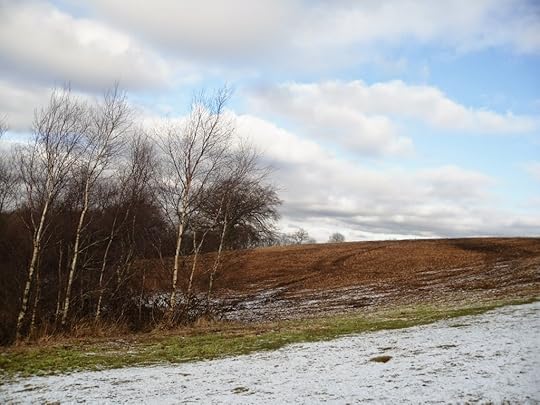 Clent Hill, cold January day, 2015
Clent Hill, cold January day, 2015
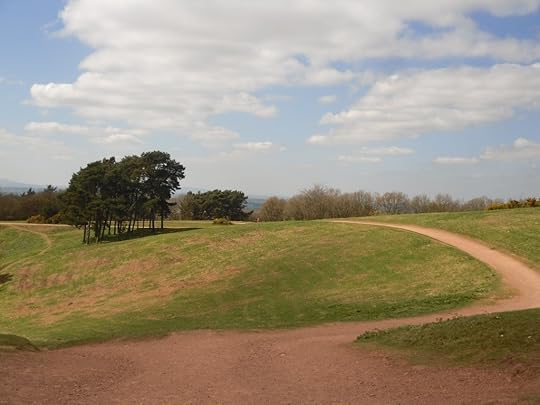 Clent Hill, hot April day, 2015
Clent Hill, hot April day, 2015
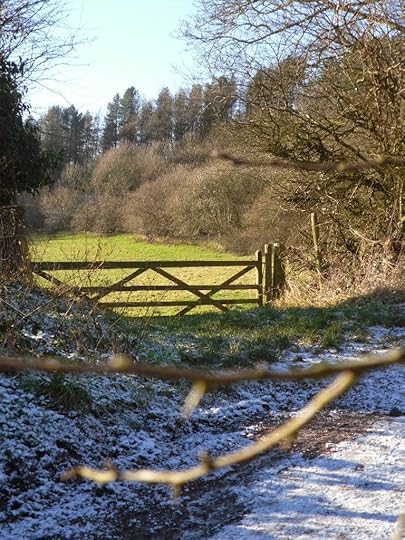 A gate, Clent Hill, January 2015
A gate, Clent Hill, January 2015
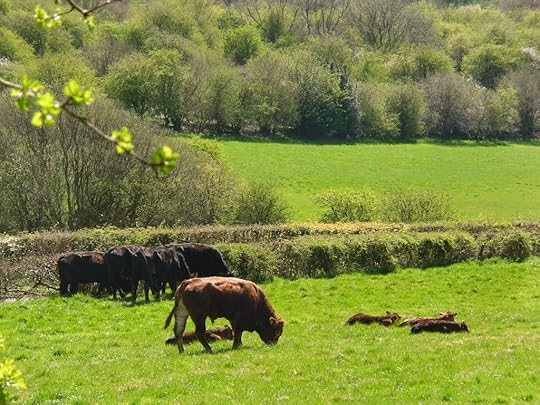 Looking over the same gate, April, 2015
Looking over the same gate, April, 2015
 First bluebells!
First bluebells!
Summer is coming.
 Taken in the Clent Hills, January 2015
Taken in the Clent Hills, January 2015 Edge of the same path, April 2015
Edge of the same path, April 2015
 Clent Hill, cold January day, 2015
Clent Hill, cold January day, 2015 Clent Hill, hot April day, 2015
Clent Hill, hot April day, 2015
 A gate, Clent Hill, January 2015
A gate, Clent Hill, January 2015 Looking over the same gate, April, 2015
Looking over the same gate, April, 2015  First bluebells!
First bluebells!Summer is coming.
Published on May 01, 2015 16:00
Susan Price's Nennius Blog
"I have made a little heap of all I've found..."
"I have made a little heap of all I've found..."
...more
- Susan Price's profile
- 71 followers



